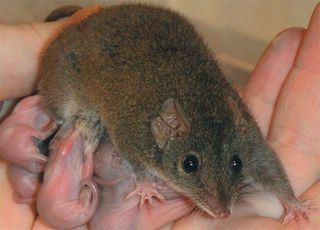Swinger Marsupials Produce Healthier Offspring

It pays to sleep around, at least for female brown antechinus, a mouse-like marsupial. By mating with multiple partners, the female has healthier babies, a study finds.
During a 10 to 14-day mating season, female antechinus seek out several males in their nests for lengthy mating bouts, each lasting up to 14 hours, before producing offspring [video].
Researchers have struggled to understand why females would mate with multiple males, when egg production is costly and 'sleeping around' raises the risk of disease and physical injury.
In a study published in the Nov. 2 issue of the journal Nature, scientists found the costly affair is the best strategy for giving birth to young that survive past weaning. They suggest stronger males have more competitive sperm, which could account for the healthier young.
Match maker
Just before the mating season, researchers led by Diana Fisher of the Australian National University captured wild antechinus and brought them into the lab where 17 females each mated with three different males and 19 females mated with a single mate.
They found that the polyandrous females, which had several mates, delivered larger litters than the exclusive females. Plus, three times as many babies from promiscuous moms survived past weaning — about three-months old — than the young of monogamous females.
Sign up for the Live Science daily newsletter now
Get the world’s most fascinating discoveries delivered straight to your inbox.
To test whether some males sired more young than others, the scientists captured 48 females and 24 males, separating them into groups in the lab. Within each “block,” each of three males mated once with three different polyandrous females and three times with one of three exclusive females. The number of offspring fathered by a particular male ranged from zero to 15 babies.
Fit fathers
Using DNA tests, the scientists determined which males fathered which babies. They tagged the males as more or less competitive based on the number of offspring they sired. The idea is that more competitive ejaculates should produce relatively more offspring than less competitive ejaculates.
Although promiscuous females mated with a mixed bag of males— fit and unfit — most of their eggs were fertilized by sperm from the fit males. The result was a healthy litter, where the babies had a high survival.
“So that means that females that mate with lots of males get more of their offspring sired by the good-quality males that increase the baby survival,” Fisher told LiveScience. Since these marsupials presumably have no way of screening for good and bad mates, Fisher suggests sleeping with many males is their best strategy for ensuring successful litters. Conclusive evidence
The scientists conclude the goal of this mating strategy is to pass along a good-quality male’s genes to offspring. Females of other animals could sleep around to increase the number of males that think they are fathers, a perhaps tricky way of ensuring more help in caring for the babies. This is not the case with antechinus, though. By the time antechinus babies are born, the fathers have already died.
“They have this short mating season when they just go crazy and after that they drop dead or their immune system collapses and they get gangrene and start hemorrhaging,” Fisher said.

Jeanna served as editor-in-chief of Live Science. Previously, she was an assistant editor at Scholastic's Science World magazine. Jeanna has an English degree from Salisbury University, a master's degree in biogeochemistry and environmental sciences from the University of Maryland, and a graduate science journalism degree from New York University. She has worked as a biologist in Florida, where she monitored wetlands and did field surveys for endangered species. She also received an ocean sciences journalism fellowship from Woods Hole Oceanographic Institution.
